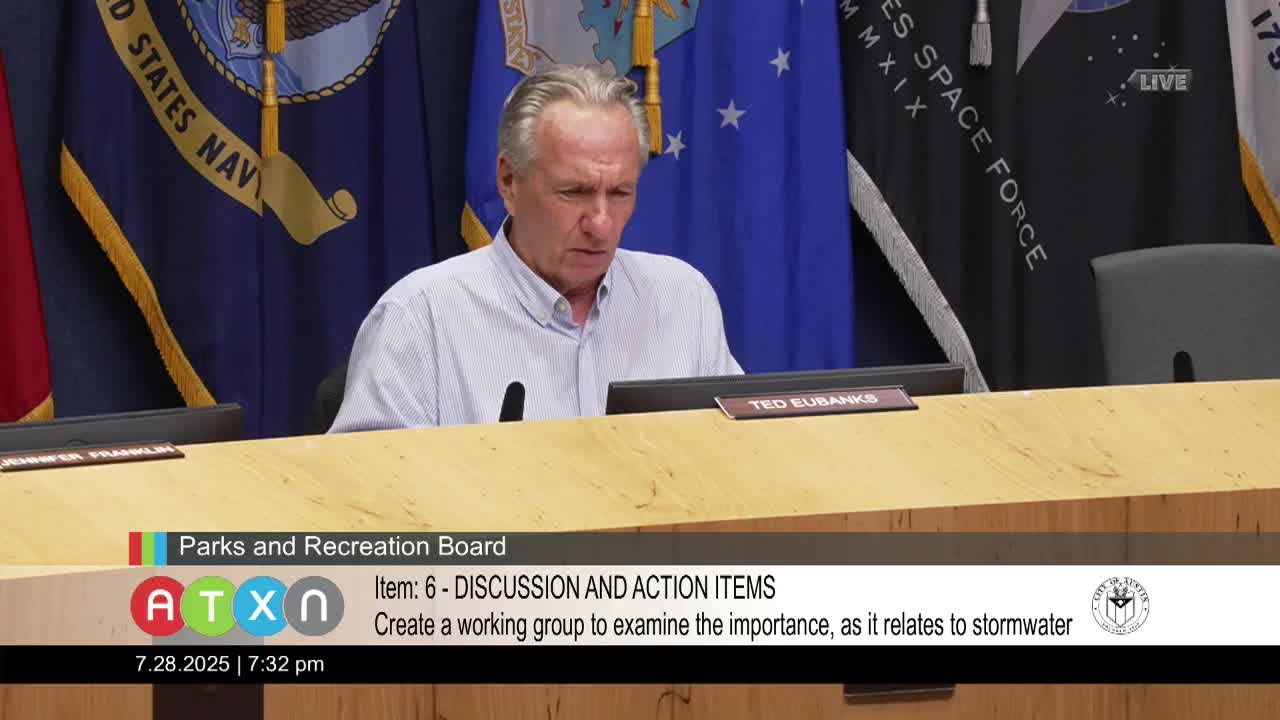Austin Park Board Establishes Working Group on Stormwater and Parkland Management
July 28, 2025 | Austin, Travis County, Texas
This article was created by AI summarizing key points discussed. AI makes mistakes, so for full details and context, please refer to the video of the full meeting. Please report any errors so we can fix them. Report an error »

Austin's Parks and Recreation Board has taken a significant step towards enhancing community safety and environmental sustainability by establishing a working group focused on the critical role of parkland in stormwater management. This decision comes in the wake of recent flooding events in nearby areas, prompting board members to emphasize the need for public awareness regarding the ecological benefits of parks, particularly in stormwater detention and retention.
During the meeting on July 28, 2025, board member Eubanks proposed the creation of a working group to gather current data on flooding and stormwater issues related to parkland. The group will explore historical flooding patterns in Austin and assess the effectiveness of existing parkland in managing stormwater. The initiative aims to provide the board with informed recommendations on how to enhance parkland's role in flood mitigation, ensuring that the community is better prepared for potential flooding events.
The board unanimously approved the motion to form the working group, which is expected to take approximately six months to compile its findings. This proactive approach reflects a growing recognition of the importance of parks not only as recreational spaces but also as vital components of the city's infrastructure for managing stormwater.
In addition to the working group discussion, the board addressed concerns regarding budget deficits and the sustainability of Austin's park system. Board members highlighted the challenges posed by recent cuts to external funding sources, which have historically supported park operations and maintenance. The board discussed the need for collaboration among various stakeholders, including nonprofits and city departments, to navigate these funding challenges effectively.
The meeting underscored the urgency of addressing both environmental and financial issues facing Austin's parks. As the city continues to grapple with climate change and its impacts, the board's initiatives aim to ensure that parks remain resilient and capable of serving the community's needs. Moving forward, the working group will play a crucial role in shaping recommendations that could enhance the city's approach to stormwater management and parkland utilization.
During the meeting on July 28, 2025, board member Eubanks proposed the creation of a working group to gather current data on flooding and stormwater issues related to parkland. The group will explore historical flooding patterns in Austin and assess the effectiveness of existing parkland in managing stormwater. The initiative aims to provide the board with informed recommendations on how to enhance parkland's role in flood mitigation, ensuring that the community is better prepared for potential flooding events.
The board unanimously approved the motion to form the working group, which is expected to take approximately six months to compile its findings. This proactive approach reflects a growing recognition of the importance of parks not only as recreational spaces but also as vital components of the city's infrastructure for managing stormwater.
In addition to the working group discussion, the board addressed concerns regarding budget deficits and the sustainability of Austin's park system. Board members highlighted the challenges posed by recent cuts to external funding sources, which have historically supported park operations and maintenance. The board discussed the need for collaboration among various stakeholders, including nonprofits and city departments, to navigate these funding challenges effectively.
The meeting underscored the urgency of addressing both environmental and financial issues facing Austin's parks. As the city continues to grapple with climate change and its impacts, the board's initiatives aim to ensure that parks remain resilient and capable of serving the community's needs. Moving forward, the working group will play a crucial role in shaping recommendations that could enhance the city's approach to stormwater management and parkland utilization.
View full meeting
This article is based on a recent meeting—watch the full video and explore the complete transcript for deeper insights into the discussion.
View full meeting
